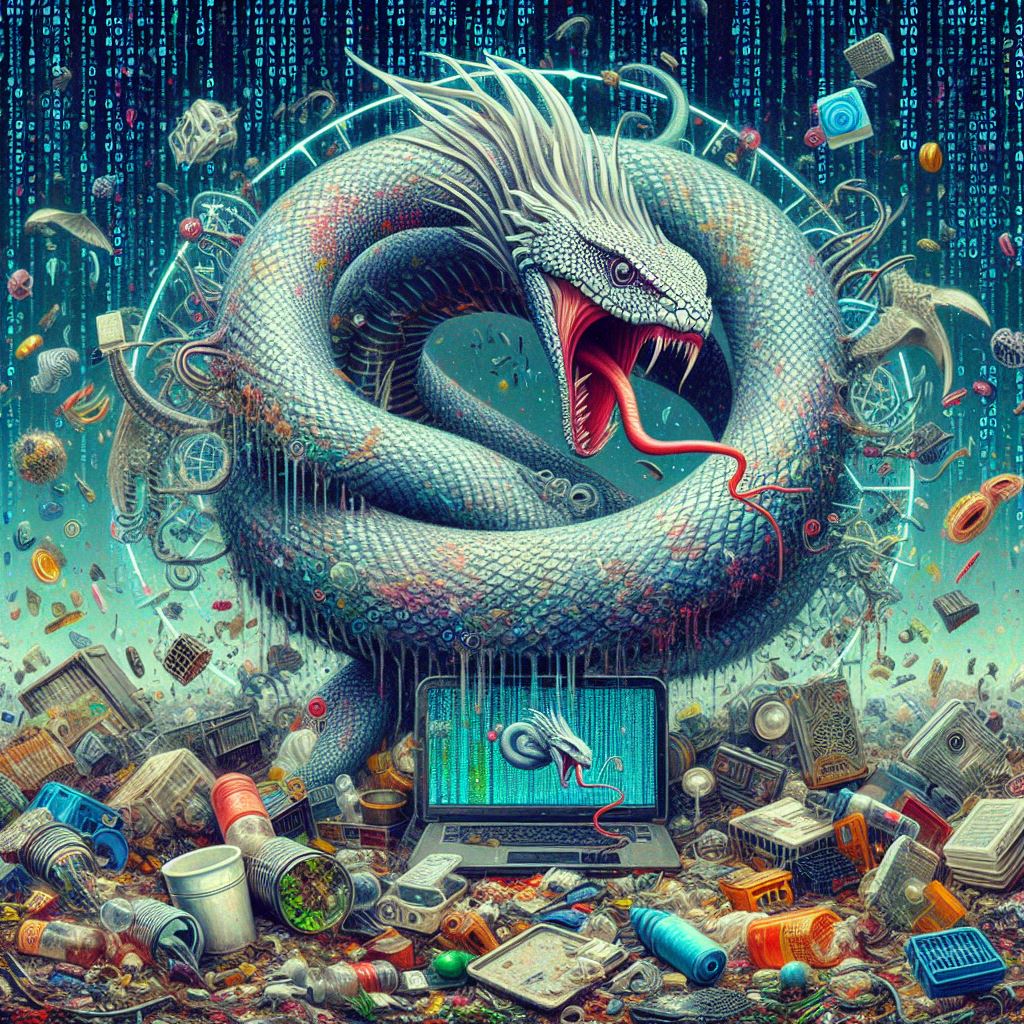Deep in our subconscious minds, as Alan Watts says, lies the notion of the world as a huge fabrication, a colossal construct. This of course goes hand-in-hand with the Western theological tradition of God as the Creator of the universe, the Fabricator of the universe. What could be simpler to understand than this? On the one hand we have the Artificer, and on the other hand we have the artefact – which is the physical universe.
This might be very simple to understand, it might be a very easy-to-digest metaphor – taken straight out of everyday life (the ‘potter and the pot’ – to use Alan Watts’ ‘ceramic model’) but this in itself is no recommendation. The undeniable ease of understanding which the ceramic model provides us with is not necessarily a good thing. After all, if the metaphor in question proves to be erroneous, then that very same ‘ease of understanding’ which we like so much will act against us instead of for us, and hopelessly enmesh us in the most dreadful confusion. The undoubted power of the metaphor will become our enemy rather than our friend and it will mislead us, misguide us, misinform us – whilst at the same time leaving us utterly unable to see that we have been misled, misguided, misinformed…
Of course in everyday life we come across stuff that has been made, stuff that has been fabricated. Of course we understand this idea very well. But how could we possibly imagine that Reality itself is a mere product? How could we ever imagine that the Totality of Everything has been fabricated like a pair of shoes or a flat-screen TV? Where is our thinking at?
One way of explaining why we are thinking this way is to say that our conditioning is basically of the Christian variety and the ‘bottom line’ – so to speak – in the orthodox teaching of the Church is that ‘God created the world’. That’s what it says in the Book of Genesis. Of course, the story related in Genesis isn’t unique – every culture throughout human history has its own creation myth of one sort or another, it seems. The details differ but the essentials remain the same – beforehand the world wasn’t there and then some force or other creates it, so that it does get to be there!
Creation myths – as is often said – allow us to make sense of the fact that the world exists (instead of not existing, which generally seems to us to be the easier alternative). This ‘need to explain’ goes deeper than we might think however. It might be said that the human mind needs to makes sense of the brute fact of existence but this is not a distinctively ‘human’ thing – logic itself needs to explain existence, one way or another. The nature of logic is such that every event, every phenomenon it comes across must been seen as part of a chain of ‘cause-and-effect’. It is inconceivable to logic that this should not be the case. Therefore, we can say that it is not at all a peculiarity of the human mind that we should have a need to explain how the universe got here, a need to account somehow for this singular fact, but that this need exists in every logic-based mind, no matter what organism that mind belongs to, no matter what planet or star-system that organism might happen to live on…
For there just to be something – with no cause, no explanation, no logical reason for how it got there, why it is there – is just plain unacceptable to logic. Such a thing is unacceptable because it undermines the very principle that logic is based upon, and if this principle is undermined even in one case then this scuppers everything! It is like a sailing boat with one plank taken out of its hull – it might only be one plank that we have taken out, and there might be hundreds of perfectly good planks left in the hull, but the boat will sink just the same.
If the logical mind were to come across something for which there is no explanation at all, something that it cannot show to follow the same rules that everything else does, or fit into the same framework that everything else does, then this would be a similar situation. It is not just that the logical mind would then get baffled and bamboozled – it would actually have no choice then but to disappear in a puff of smoke. Logic needs for everything to be explainable within its own terms and if can’t do this then the whole thing falls down. There can’t be any gaps in the structure; there can’t be any irreducible uncertainty. The system of logic has to subsume everything if it is to exist at all – it cannot play second fiddle, it cannot give way to a superior principle.
Why this is so can be seen very easily if we consider the difference between ‘absolute’ and ‘relative’ truth. If there is anything at all that the logical mind doesn’t know about, and more importantly can’t know about, then everything that it does know is only true in relation to what it does know (or rather, in relation to what it thinks it knows). This bursts the bubble of absolute (or ‘positive’) knowledge therefore, and – rather like Humpty Dumpty – once the bubble has been burst it can’t be put back together again!
When stuff is true only because I don’t know enough to know that it isn’t true, then this is of course not really reliable at all! My knowledge is only locally true, provisionally true – it is only ‘true within certain arbitrary limits’. Or to be even more direct about it, relative truth means that ‘such-and-such is true only because I assume that it is true’ (i.e. ‘such-and-such is true only because I say that it is true’). This doesn’t just weaken our position, therefore – it does away with it entirely. We have no position left, which feels very uncomfortable, to put it mildly.
Relative knowledge is thus not the same sort of thing as absolute knowledge at all because whilst the whole idea of absolute knowledge is that it is made up of definite statements that we really do have a completely solid basis for making, relative knowledge is just a game that we choose to play! Relative truth is just ‘pie in the sky’ – it is just what happens when we assume that such-and-such is the case, when it doesn’t actually have to be the case at all. It’s only the case because we choose to say that it is, which is no basis at all.
Faced head-on with relativity in this way the thinking mind does more than just quail and go weak at the knees therefore– it gives up the ghost entirely. It needs solid ground under its feet or it cannot stand and in the absence of any solid ground – which is what relativity means – it has to invent the stuff.
When the logic-based mind comes across something that it can’t explain this means that this ‘something’ is not within its remit, not within its domain or kingdom, because within its domain or kingdom everything is explainable, everything can be accounted for. But the logical mind has to take the position that its remit is not just ‘a remit’ but the whole of everything, that its domain is actually the very same thing as ‘the whole of reality’, which is why rationalists always have such absolute resistance to the realm of the irrational, the realm of the unexplained.
The idea of logic being able to put forward an explanation for the Whole of Everything is actually totally paradoxical, totally ridiculous – this is an endeavour that logic should never have tried to involve itself in. We can relate to the Whole of Everything intuitively, but not rationally. We can feel that the Whole of Everything exists, but we can’t prove that it exists, explain what it is, or describe it to ourselves in any way.
Why this has to be the case is obvious enough once we reflect on the matter – rationality works after all by drawing boundaries, by splitting things up, by creating classes and categories, and so if it is the Whole we are after then this most emphatically isn’t the way to go about it!
If we are trying to find out about the Whole by using the instrument of the logical mind then we have backed the wrong horse and no mistake – how can creating innumerable categories or divisions of thought with which to talk about or describe the world help us to see what the world would look like when we erase all the dividing lines? By thinking about it we’re heading deeper and deeper into the artificial fragmentation of reality, and further and further away from whatever it was that we were originally trying to find out about…
Just as trying to think about (or define) the Whole inescapably leads us straight slap-bang into an insoluble paradox, so too is it the case that creating the Whole inescapably paradoxical, which is what we started off talking about. Creating the Whole of Everything is paradoxical because it implies that there is something outside of the Whole, which is obviously impossible! Theology can get around this by saying that the question is not the creation of ‘the Whole of Reality’ but the creation of the physical universe by a Divine principle that is separate or distinct from the creation itself.
All this shows however is that we are using – as ever – our rational mind to try to work things out, and this mind has produced for us a supposedly all-important division between God and His creation. This is however all that the categorical mind ever does – it produces categories, it delights in categories. The mental category labelled ‘God’ is no different from any other tawdry category that we might come up with. It is no different from the mental category ‘chewing gum’ or the mental category ‘socks’ or the mental category ‘office equipment’…
The only way to truly gain insight into anything is not by the utilizing the fussy old mind with its ridiculously watertight compartments, this dusty, fusty bureaucratic old mind that we love so much, but by dropping the attempt to think about things, and giving the intuitive mind chance to get a look in instead. Intuitively, we can feel that there is a unity that goes beyond anything logical thought can explain, which is why no mystic has ever come up with this fusty hide-bound old business about the physical universe being different from or distinct from God – that is the theological take on things, not the mystical take. The theological take is that of the everyday mind, which has lots and lots to say – but no interest in anything that it can not say!
If we do not say anything, or think anything, then there is no division between the world and anything else. If no divisions exist, then it is meaningless to talk about the world being created (just as it is meaningless to talk about it being destroyed). As the seventeenth century clergyman, poet and mystic Thomas Traherne writes in his Centuries of Meditations,
The corn was orient and immortal wheat, which should never be reaped, nor was ever sown. I thought it had stood from everlasting to everlasting.
If something has no boundaries, no beginning, and no end, then how can it be created or destroyed? Without divisions causality breaks down because causality only ever relates one category to another – one mental category being the ‘cause’ and the other the so-called ‘effect’.
What the discursive mind can never see however is that any two things that are linked by cause-and-effect are always bound to be the same thing. If the relationship between one statement and the subsequent, causally-related statement is defined by logic, then the second statement must inevitable be a restatement of the first!
Logic never results in anything unpredictable, anything radically new – it can’t do for the simple reason that logic is based on rules and rules define what happens, stipulate what happens, specify what happens, determine what happens… That after all is the whole point of a rule – a rule that is laissez faire, a rule that is easy-going with regard to what possibilities may unfold and what may not unfold, is not any sort of a rule at all.
But saying that a rule ‘defines’ what is to happen, ‘specifies’ what is to happen etc, is exactly the same as saying that nothing new can come out of a rule. It is the same thing as saying that nothing can come out of a rule that was not already in it, and if this is the case then all chains of cause-and-effect are tautological.
This is simply a fancy way of saying that all the different categories of thought that the logical mind comes up with are really all the very same thing – so that when we say category A causes category B (or gives rise to it) this is actually quite meaningless. How can a thing ‘cause’ itself? Similarly, saying that mental category A ‘explains’ mental category B is quite nonsensical. How can a thing explain itself?
And yet the world that rationality creates is held together by the notion that some parts of it ‘create’ other parts, that some aspects of it ‘explain’ other aspects. This spurious notion is the ‘hot air’ which we use to inflate the balloon of the logically-constructed world, and allows us therefore to inhabit that world – as if there were actual genuine space within it that would allow us to inhabit it…
Really the world that the thinking mind invents for us is a virtuality that constantly provides for itself a false kind of space, a false kind of perspective, a false kind of differentiation between defined categories or possibilities. This false type of space allows us to go on believing in the mind-created world, this false type of perspective (or differentiation) allows us go on taking it seriously.
So whilst reality itself can’t be created or constructed, the virtual world of our thoughts can be. Thought creates or constructs its own world – and yet the very strange thing about this, as we have said, is that there is really no question of the mind ever actually creating or constructing anything because it only ever produces ‘apparently different’ versions of the same thing, which is itself…
This doesn’t really count however because nothing new has actually been created! The logical mind simply extends itself, projects itself, perpetuates itself, prolongs itself – whilst all the while maintaining the illusion that it is producing something that is genuinely different. The rational mind is its own fabrication therefore, but it is an empty fabrication – what is being ‘fabricated’ is essentially just an ongoing illusion, which as we have said ‘doesn’t really count’. Anything that can be brought about as a result of cause-and-effect can’t be real, and what is real can’t be brought about as a result of cause-and-effect…






